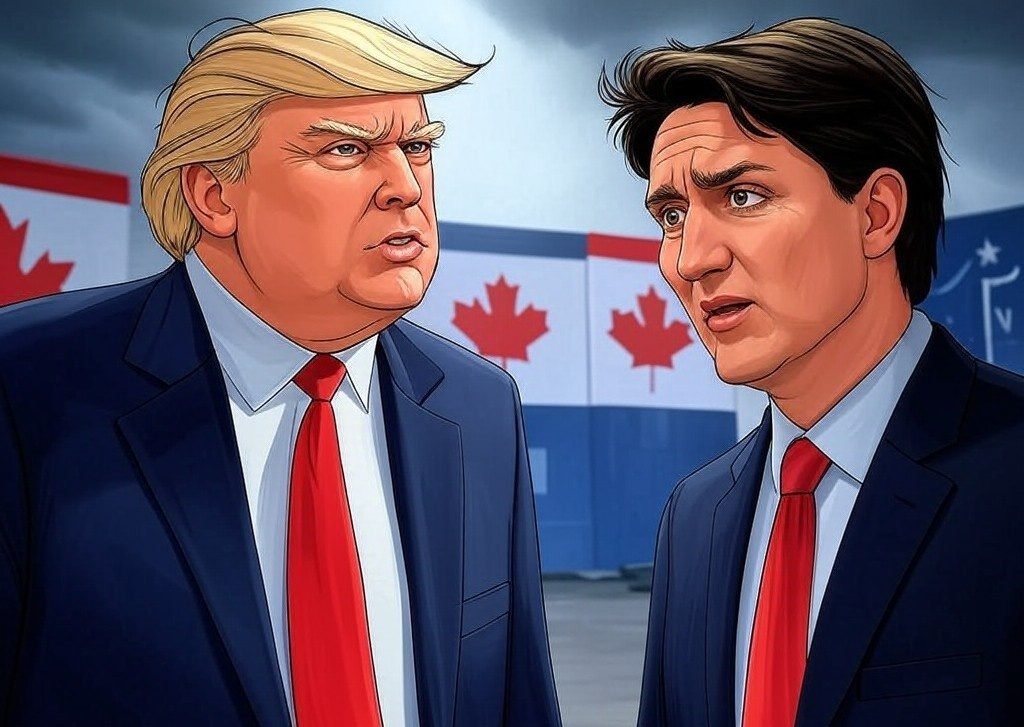Potential Trade Turmoil: Analyzing Trump’s Threats of Tariffs on Canada
As President-elect Donald Trump prepares to take office, the economic landscape between the United States and Canada hangs in the balance, particularly regarding trade relations. While it remains uncertain if Trump will impose tariffs on Canadian goods immediately, the looming threat has sparked significant concern among economists, policymakers, and the general public. John Bolton, Trump’s former national security adviser, highlights a “serious danger” of inadvertently falling into a trade war, which could have far-reaching implications for both nations.
The Trade War Threat: A Risk to Both Economies
In an interview with Mercedes Stephenson on The West Block, Bolton articulated his apprehensions, stating, “I think everyone should understand a trade war is not in anyone’s interest.” His comments underscore the potential for economic fallout that could arise from aggressive tariff policies. Trump’s threats to impose a sweeping 25 percent tariff on all Canadian goods unless Canada enhances border security have left many questioning the rationale behind such measures.
Bolton elaborated on the mechanics of tariffs, explaining, “The way tariffs work is, it’s the American importer that pays the tariff and then tries to pass it along to the consumer.” This highlights a crucial point: high tariffs function as an indirect tax on American taxpayers, which contradicts the simplistic notion that taxing Canada or Mexico would solely impact those countries. “Trump simply does not understand that,” Bolton noted, emphasizing that American consumers would ultimately bear the financial burden.
Canada’s Response to Tariff Threats
In response to Trump’s post-election threats, Canadian officials have been proactive in addressing the concerns raised by the U.S. administration. Foreign Affairs Minister Melanie Joly warned that the imposition of tariffs could initiate “the biggest trade war between Canada and the U.S. in decades.” Such a conflict could devastate not only the Canadian economy but also ripple through the U.S. market, affecting industries reliant on cross-border trade.
To mitigate the potential fallout, Canada has outlined plans to tighten border security while also communicating the adverse effects that tariffs would have on U.S. consumers. The Canadian government is working diligently to impress upon Trump that imposing tariffs would not only harm Canada but also negatively impact the American economy, including increasing consumer prices and inflation.
The Impact of Retaliation and Economic Strategy
While retaliatory measures might seem like a tempting avenue for Canada, Bolton cautions against such a strategy. He argues that retaliation could escalate tensions further, creating an environment ripe for a trade war that none of the involved parties desire. Instead, he posits that Canadian leaders should frame their arguments in a way that appeals to Trump’s self-interest, emphasizing how tariffs would ultimately hurt his own political base. “Higher consumer prices in the United States will look like increased inflation,” Bolton remarked, suggesting that this could undermine Trump’s support among voters.
Beyond Trade: Defense Spending and NATO Relations
The discussion surrounding tariffs is not the only area of concern for Canada under Trump’s administration. Recently, Trump proposed that NATO members should allocate five percent of their GDP to defense spending, a significant increase from the current target of two percent. As of November 2024, Canada was one of only eight NATO members not meeting this benchmark.
Bolton emphasized the importance of Canada meeting its defense commitments, stating, “The sooner you get to two percent, the better.” He argues that in a world filled with threats comparable to those experienced during the Cold War, nations must invest adequately in their defense capabilities. Prime Minister Justin Trudeau has assured that Canada is on track to meet the two percent goal by 2032, although skepticism remains among analysts about whether this timeline can be achieved.
The Broader Economic Implications of Tariffs
The potential for tariffs to ignite a trade war extends beyond immediate economic concerns. Experts warn that such conflict could lead to broader global economic instability, affect investment decisions, and disrupt supply chains that rely on the seamless flow of goods between the U.S. and Canada. This interconnectedness is crucial, as both countries share extensive trade relationships that support millions of jobs on both sides of the border.
Moreover, the tariffs could have unintended consequences, sparking retaliatory tariffs from Canada and other nations. This tit-for-tat scenario could escalate quickly, leading to a decline in trade volumes, increased costs for businesses, and ultimately, a slowdown in economic growth for both countries.
Conclusion
The potential for a trade war between the United States and Canada following Trump’s election poses significant risks to both nations. As the dialogue continues, it is crucial for Canadian officials to communicate effectively the implications of tariffs, not only for Canada but for American consumers as well. The stakes are high, and the outcomes of these discussions will shape the economic landscape for years to come. The importance of maintaining a collaborative approach to trade and defense spending cannot be overstated, as both countries navigate the complexities of their relationship under the new administration. Ultimately, it is in the best interest of both nations to seek solutions that foster cooperation rather than conflict in an increasingly interconnected world.




